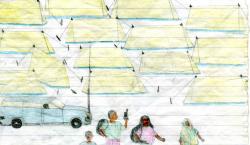Advertisement
Ceasefire halts Syria-Lebanon border fight against Islamic State
BEIRUT (Reuters) - A ceasefire took effect on Sunday in an Islamic State enclave straddling the Syria-Lebanon border, where the militants have been fighting the Lebanese army on one front and Hezbollah with Syrian troops on the other.
The Lebanese army announced that a ceasefire in its own offensive took effect at 7:00 a.m (12 a.m. ET) but did not mention Syria's side of the frontier.
Hezbollah and the Syrian army declared a ceasefire in their attack against Islamic State in Syria's western Qalamoun region, Hezbollah's al-Manar TV said.
The battle began a week ago when the Lebanese army, and Hezbollah together with Syrian government forces, launched separate but simultaneous assaults.
Both offensives have advanced toward the border from opposite sides. Lebanon and Shi'ite Hezbollah each said they have made gains against the militants, driving them back into a smaller zone in the arid hills on the border.
The Islamic State enclave in the barren mountains marks the last militant foothold along the Syria-Lebanon frontier.
Northeast Lebanon saw one of the worst spillovers of Syria’s war into Lebanon in 2014, when Islamic State and other militants briefly overran the border town of Arsal. The fate of nine soldiers that Islamic State took captive then remains unknown.
The Lebanese army said the ceasefire would pave the way for negotiations over the fate of the soldiers.
A military source said Islamic State militants had "succumbed under fire and asked for negotiations. But if any devious intentions appear," the army would press on with its assault near the town of Ras Baalbeck in the northeast.
Talks have begun with mediation by the head of Lebanon's internal security agency, a security source said.
Several ministers arrived in an army command center in Ras Baalbeck on Sunday to monitor the situation.
Nusra Front militants and a Syrian rebel group withdrew from Lebanon's border region earlier this month. They departed for insurgent territory in Syria after offensives by Hezbollah and the Syrian army.
MISSING SOLDIERS
The security source said on Sunday that Hezbollah entered an area in western Qalamoun to confirm if the Lebanese soldiers were buried there.
Under the first stage of the ceasefire deal, Hezbollah forces were digging there for remains thought to belong to some of the soldiers, said an official in the military alliance fighting in support of the Damascus government.
Islamic State militants have asked Hezbollah and the Syrian army to let them withdraw from the enclave to Syria's Deir al-Zor province, the official had said.
Hezbollah has played a major role in fighting Sunni militants along the border during Syria's six-year war and has sent thousands of fighters to support Syrian President Bashar al-Assad.
In a speech last week, Hezbollah leader Sayyed Hassan Nasrallah said the Iran-backed group had begun talks with Islamic State on a truce.
If Lebanon wanted to negotiate for Islamic State to evacuate its territory, he said, the Syrian government would be ready to accept any formal request from Beirut.
The Lebanese army has said it is not coordinating its attack with the Syrian army or Hezbollah, which Washington classifies as a terrorist group.
Any coordination between the Lebanese army and either the Syrian army or Hezbollah would be politically sensitive in Lebanon and could jeopardize the sizeable U.S. military aid the country receives.
Hezbollah and its allies have been pressing the Lebanese state to normalize relations with Damascus, testing Lebanon's official policy of neutrality toward the conflict next door.
A Western diplomat praised the Lebanese army's performance in the border battle in "a risky and complex operation" and said it would have been "simply unimaginable" a decade ago.
"We see no evidence of substantive cooperation (between the army and Hezbollah)," the diplomat added.
The pro-Damascus official and a source familiar with the talks said there has been communication between Hezbollah and the Lebanese army over the ceasefires and the negotiations with Islamic State.
(Additional reporting by Laila Bassam and Tom Perry; Editing by Michael Perry and Louise Heavens)



















Add new comment